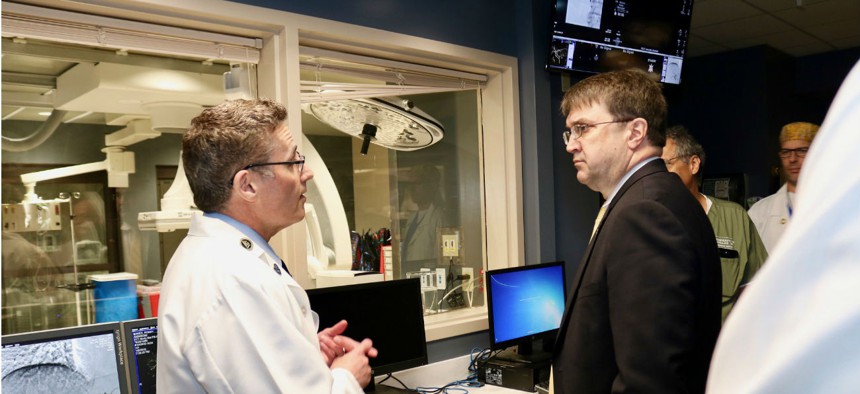
VA Secretary Robert Wilkie, above right, tours the Minneapolis VA Health Care System in August 2018. VA photo
Panel Pushes Measure to Allow VA Docs and Nurses to Negotiate Pay, Scheduling
The Veterans Affairs Department opposes the legislation, saying it would harm delivery of care to veterans.
House Democrats on Tuesday continued their push to expand collective bargaining rights to thousands of Veterans Affairs Department employees, advocating a bill to allow nurses, doctors and dentists to negotiate over pay and other issues.
The House Veterans Affairs Committee’s panel on Oversight and Investigations discussed the measure during a hearing on Tuesday, during which VA management voiced strong opposition to the measure. The VA Employee Fairness Act (H.R. 1133) would allow medical workers to negotiate compensation, scheduling and staffing levels. Since 1991, those individuals have been prohibited from bargaining over professional conduct or competence, peer-review, or changes to employee compensation. In 2018, VA Secretary Robert Wilkie expanded the definition of what qualified as impacting “direct patient care” to strip union medical personnel of the ability to use official time.
Labor-management relations have only soured since then, as the department threatened to evict unions occupying space in VA facilities if the unions did not agree to start paying rent.
“Strengthening collective bargaining rights would give important protections to a large number of health care providers at VA facilities, resulting in improved quality of care for our nation's veterans,” said Rep. Mark Takano, D-Calif., who chairs the full VA committee and wrote the legislation. “This bill would bring parity to the doctors, nurses and others who provide care by restoring full collective bargaining rights for any clinicians who work in VA facilities.”
Takano noted the health care employees work “side by side” with other employees, such as psychologists and social workers, who enjoy full collective bargaining rights. Supporters of the bill noted the Veterans Health Administration has more than 40,000 vacancies and said efforts to provide more competitive pay and a better work environment would help recruit new medical care providers. Sen. Sherrod Brown, D-Ohio, has introduced companion legislation in the Senate.
Republicans on the committee voiced opposition to the measure, suggesting it would harm care for veterans and give certain VA employees rights not afforded to other federal employees.
“This would have a direct and negative impact on patient care and accountability,” said Rep. Jack Bergman, R-Mich. “Allowing unions to negotiate and grieve compensation, a right not generally provided to other federal bargaining unit members, we only add expense and delay.”
Jessica Bonjorni, VHA’s head of workforce services, said VA “strongly opposes” the bill, suggesting it would lead to prolonged negotiations and third-party arbitration any time the department opted to make changes in how it delivered care. She added it would make it more difficult for VA to hold poor performers accountable.
Kathleen Pachomski, president of a local chapter of the American Federation of Government Employees, which in total represents about 260,000 VA employees, said she was tired of seeing medical clinicians “singled out day after day for differential treatment and fewer workplace rights.” She said she consistently sees employees leave because they have no voice in the workplace.
“As a 12-year veteran of the United States Navy, I also feel offended and dishonored that those of us who have borne the battle and chosen to serve our fellow veterans at the VA have been silenced and treated as lesser than other federal employees taking care of veterans at the VA and active duty personnel at Department of Defense facilities,” Pachomski said.
The committee also considered the VA Hospitals Establishment Leadership Performance (HELP) Act (H.R. 4949), which would require VHA to establish qualifications and standardized performance metrics for each of its human resources positions. Rep. Mike Bost, R-Ill., who introduced the measure, said it would help VA root out problematic workers.
“It is common in VA to have problem employees and move problem employees into high-level jobs with greater responsibilities without assessing prior performance,” Bost said. He criticized the department for taking “limited action” to address the issue.
Bonjorni said VA also does not support the HELP Act. She noted the department has already realigned HR functions to centralize them at the regional level and instituted mandatory skills training, and said the legislation was too specific and would make it harder to recruit HR professionals from other agencies and retain those it already employs.
The panel also considered the 2020 Strengthening Oversight for Veterans Act (H.R. 5843), a measure that would provide VA’s inspector general with subpoena authority. The measure would include giving investigators the power to compel testimony from former VA employees, former contractors and other relevant individuals. Christopher Wilbur, counselor to VA’s IG, told the subcommittee on Tuesday his office “strongly supports” the bill, highlighting the checks in place to prevent abuse of the new authority and the Defense Department IG’s similar existing authority.







